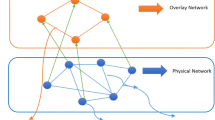Abstract
Peer-to-peer (P2P) computing has emerged as an alternative model of communication and computation to client-server model. While, P2P computing may significantly increase the performance and the scalability of the whole system, they still are facing many challenges in achieving these goals. In this paper we study the problem of scheduling a large number of tasks on such systems. We propose two techniques based on heuristic approach: a Recursive Neighbour Search and an Augmented Tabu-Search technique. These techniques do not address directly the load-balancing problem since it is completely unrealistic in such large environments, but we will show that even a non-perfectly load-balanced system can behave reasonably well by taking into account the tasks’ time demands. These algorithms are compared to a well known scheduling algorithm in order validate their performance.
Access this chapter
Tax calculation will be finalised at checkout
Purchases are for personal use only
Preview
Unable to display preview. Download preview PDF.
Similar content being viewed by others
References
Kavi, K., Marquis, J., Shirazi, B., Chen, H.B., Hurson, A.R.: Parsa: A parallel program software tool. In: 1994 Symp. Assessment of Quality Software Development Tools, IEEE CS Press, Los Alamitos (1994)
Bemmerl, T.: The topsys architecture. In: Burkhart, H. (ed.) CONPAR 1990 and VAPP 1990. LNCS, vol. 457, pp. 732–743. Springer, Heidelberg (1990)
Clark, D.: Face-to-face with peer-to-peer networking. Computer 34(1), 18–21 (2001)
Gong, L.: Peer-to-peer networks in action. IEEE Internet Computing, 37–39 (January/February 2002)
Karger, D., Morris, R., Balakrishnan, H., Kaashoek, M.F., Stoica, I.: Looking up data in p2p systems. CACM 46(2), 43–48 (2003)
Krueger, P., Livny, M.: The diverse objectives of distributed scheduling policies. In: IEEE CS Press (ed.) Proc. IEEE 7th Int’l Conf. On Distributed Computing Systems, Los Alamitos, Calif., pp. 242–249 (1987)
Lee, J.: End-user perspective on file-sharing systems. CACM 46(2), 49–53 (2003)
Lee, S.Y., Cho, C.H.: Load balancing for minimizing execution time of a target job on a network of heterogeneous workstations. In: Feitelson, D.G., Rudolph, L. (eds.) JSSPP 2000, pp. 174–186 (2000)
Lo, V., Rajopadhy, S., Gupta, S., Keldsen, D., Mohamed, M., Nitzberg, B., Telle, J., Zhong, X.: Oregami: Tools for mapping parallel computations architectures. Int’l Parallel Programming 20, 237–270 (1991)
Pulidas, S., Towsley, D., Stankovic, J.: Imbedding gradient estimators in load balancing algorithms. In: IEEE CS Press (ed.) Proc. IEEE 8th Int’l Conf. On Distributed Computing Systems, Los Alamitos, Calif., pp. 482–490 (1988)
Reeves, C.R.: Modern Heuristic Techniques for Combinatorial Problems. McGraw-Hill, New York (1995)
Savvas, I., Kechadi, M.-T.: Some results on the load distribution of heterogeneous distributed systems. In: SCI-02, Orlando, Florida, USA (June 2002)
Almeida, V.A.F., Meira, W., Menascé, D.A., Fonseca, R.: E-representative: A scalable scheme for e-commerce. In: 2nd Int’l. Workshop on Advanced Issues of E-commerce and Web-Based Infroamtion Systems (WECWIS 2000), Milpitas, CA, June 8-9 (2000)
Wang, Y.T., Morris, R.J.T.: Load sharing in distributed systems. IEEE Trans. Computers C-34(3), 204–217 (1985)
Zhou, S.: A trace-driven simulation study of dynamic load balancing. IEEE Trans. Software Eng. 14(11), 1327–1341 (1988)
Author information
Authors and Affiliations
Editor information
Editors and Affiliations
Rights and permissions
Copyright information
© 2004 Springer-Verlag Berlin Heidelberg
About this paper
Cite this paper
Savvas, I., Kechadi, T. (2004). Performance Study of Scheduling Mechanisms for Peer-to-Peer Computing Environments. In: Wyrzykowski, R., Dongarra, J., Paprzycki, M., Waśniewski, J. (eds) Parallel Processing and Applied Mathematics. PPAM 2003. Lecture Notes in Computer Science, vol 3019. Springer, Berlin, Heidelberg. https://doi.org/10.1007/978-3-540-24669-5_123
Download citation
DOI: https://doi.org/10.1007/978-3-540-24669-5_123
Publisher Name: Springer, Berlin, Heidelberg
Print ISBN: 978-3-540-21946-0
Online ISBN: 978-3-540-24669-5
eBook Packages: Springer Book Archive




